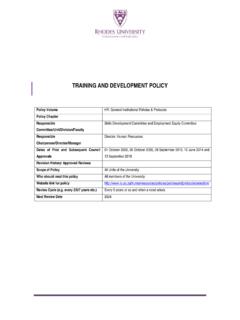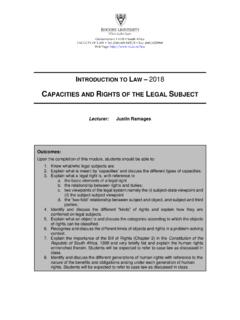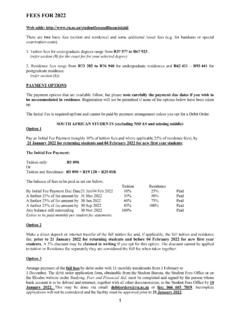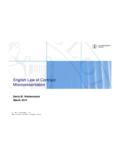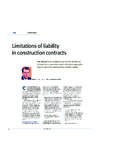Transcription of LAW OF CONTRACT A - 2012
1 LAW OF CONTRACT A - 2012 1. INTRODUCTION Overview The Law of CONTRACT A is a self-standing semester course that counts as a credit in the Faculty of Law in the LLB2, as well as comprising one of the six component courses in the Legal Theory 3 major in the Faculties of Humanities, Science and Commerce. Students who pass the Law of CONTRACT A as part of the Legal Theory major are exempted from the course in the LLB curriculum. The purpose of the course is to provide insight into the nature and function of the law of CONTRACT in South Africa. More particularly: To provide the students with an understanding of the historical development of the uniquely South African law of CONTRACT from its Roman, Roman-Dutch and English roots.
2 To provide the students with a thorough understanding of the essential elements of a valid CONTRACT in South African law. To assist students in being able to identify and solve authentic legal problems with regard to the negotiation and creation of contracts. To familiarise students with legal concepts and terminology commonly encountered in the law of CONTRACT . To assist students in extracting principles from law reports and other source material. Credit Value 10 Credits Assumptions of Prior Learning When entering the course, students need to be able to: Be capable of writing and communicating in coherent English. Know how and where to access resources such as textbooks, law reports and statutes in the Law Library.
3 Have a working knowledge of basic legal concepts and terminology. Be capable of independent learning. Read, analyse and extract principles from law reports and other source material. Understand the system of judicial precedent, and the important role precedent plays in private law. Have an understanding of legal problem-solving techniques and how to apply these to solve legal problems. Have a working knowledge of legal referencing conventions, and to be able to apply these to their written work. Have a basic understanding of constitutional principles and how these principles impact on private law issues. 2. OUTCOMES Critical Outcomes Students will be able to: (a) identify and solve practical legal problems.
4 (b) organise and manage themselves and their work load. (c) collect, analyse and evaluate information from the various sources of law, as well as information conveyed in the classroom environment. (d) communicate effectively in class debate and written assignments. (e) use technology in legal research. (f) recognise problem-solving contexts involving the law of CONTRACT . Intended Specific Outcomes The Law of CONTRACT A course is designed so that students successfully completing this course should be able to achieve the following outcomes. The student should be able to: (a) Understand how the South African law of CONTRACT has developed from its Roman, Roman-Dutch and English roots.
5 (b) Understand and explain the essential elements of a valid CONTRACT , and their various requirements. (c) Understand and explain the sorts of legal issues that can affect the existence of the various contractual elements, and how the contractual relationship will be affected as a result. (d) Apply the knowledge acquired during the course to solve practical problems with regard to the negotiation and creation of a CONTRACT . 3. TEACHING METHODS The course will be presented by means of viva voce lectures. There is no comprehensive hand-out for the course, and students will be expected to take their own notes during class.
6 In lectures, the substantive law will be discussed, leading precedents from the case law will be analysed, and the views of leading academic commentators will be explained. Occasionally, students will be expected to explain case law and consider practical questions in class. Students are expected to assume responsibility for their learning by reading ahead before each lecture, and consolidating afterwards. There is a prescribed textbook for the course. Lectures are compulsory. A student may not miss more than five lectures without excuse. Voluntary supplemental tutorials are offered on a rotational basis in conjunction with the other Legal Theory Three courses.
7 Problem solving will be a focus of these tutorial sessions. 4. COURSE CONTENT I An introduction to the development of the South African Law of CONTRACT . II The Elements of a Valid CONTRACT : Capacity Consensus - Offer and Acceptance - Absence of consensus: Theories of CONTRACT and the Law of Mistake; Signed Documents & Ticket Cases; Rectification - Improperly obtained consensus (Misrepresentation; Duress; Undue Influence; Bribery) Legality - General principles of public policy and legality - The impact of the constitution on CONTRACT law - Specific topics on legality (gambling, covenants in restraint of trade) Possibility of performance Formalities III Parties to contracts 5.
8 RESOURCES The core reading and study material for this course are the leading judgments on the aspects of the law of CONTRACT to be studied. These cases may be found in the law reports, which may be accessed in the Law Library, both in paper and electronic form. For a full list of cases, see the Course Outline for Students. As far as textbooks are concerned, there is a prescribed text: Hutchison et al The Law of CONTRACT in South Africa (Oxford University Press, 2009). Other texts that can be consulted are: Christie The Law of CONTRACT in South Africa (2006), 5th edition, Butterworths: Durban. Sharrock The Law of CONTRACT in LAWSA Vol 5(1) (2004) Butterworths: Durban.
9 Kerr The Principles of the Law of CONTRACT (2002) 6th edition, Butterworths: Durban. Van der Merwe, Van Huyssteen, Reinecke and Lubbe CONTRACT : General Principles (2003) 2nd edition, Juta: Cape Town. De Wet and Van Wyk Die Suid-Afrikaanse Kontraktereg en Handelsreg (1992) 5th edition, Butterworths: Durban. Joubert CONTRACT : General Principles of the Law of CONTRACT (1987) Juta: Cape Town. Lubbe and Murray Farlam and Hathaway: CONTRACT Cases, Materials and Commentary (1988) Juta: Cape Town. Occasionally, students will be referred to pertinent Journal articles on aspects of the course content. These may also be found in the Library.
10 Students are strongly advised to utilise these resources in the course of their studies. Students are also encouraged to browse through the shelves in the library, and familiarise themselves with the Faculty s holdings. This will stand them in good stead when research is undertaken for assignments. 6. STUDENT ASSESSMENT Specific Outcomes (On completion of this course, the student should be able to:) Assessment Criteria (What evidence must the student provide to show that they are competent? The student must be able to:) Assessment Tasks (The evidence will be gathered in the following way.)






